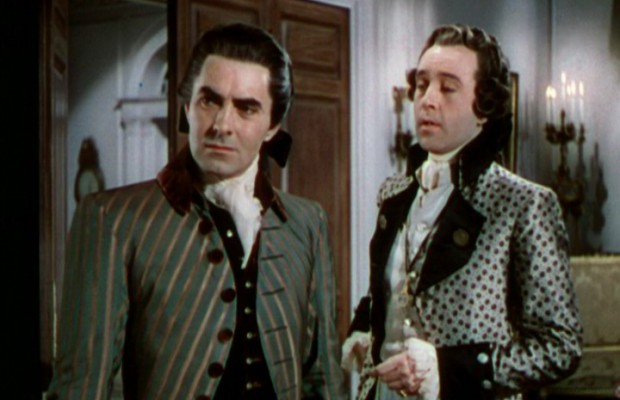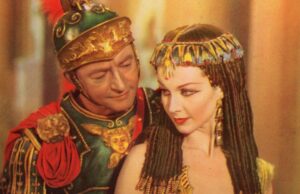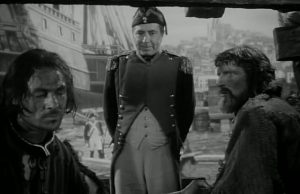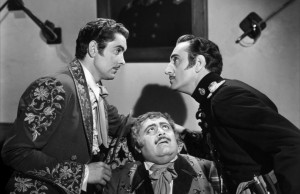I’ll Never Forget You (1951)

Toronto Film Society presented I’ll Never Forget You on Sunday, February 9, 2014 in a double bill with Peter Ibbetson, as part of the Season 66 Sunday Afternoon Film Buff Series, Programme 5.
This is the movie that changed my life. I don’t have a favourite film (it’s impossible to choose; I have dozens and dozens of favourites). But Tyrone Power is my favourite movie star, and I first discovered him in I’ll Never Forget You. This movie opened my eyes to a great deal about motion pictures. It changed me from someone who liked old movies very much, but knew little about them, to someone who absolutely loved them–and found I enjoyed learning all I could about them.
I ran into it on TV, in 1969. I joined it in progress and the closing credits were omitted, so I didn’t know the title or the names of its stars. The only cast member I recognized at the time  was Michael Rennie. Nonetheless, I found the plot absolutely riveting. By the time the main character made his airplane-flying-overhead analogy, I was completely hooked. At its conclusion, of course I wanted to learn the title, but this proved very difficult to find out. This is not a well-known movie. Upon its initial release, it was a hit in Europe, a moderate success in Britain and (following a lacklustre release by 20th Century-Fox) virtually unknown in North America. None of the movie reference books I consulted at the public library mentioned it. Making the task harder was the assortment of titles it had been given: I’ll Never Forget You, Beyond Time and Space, Man of Two Worlds, The House in the Square, Berkeley Square and La Grande Passione (in Italy). I was stymied for months, until I stumbled across Mr. Power again in 1949’s Prince of Foxes on another TV matinee, finally learned his name and worked back from there. In my hourney along the way, I learned a great deal about all sorts of movies. Primarily, I learned it was best to largely disregard the opinions of critics and film historians; it was best to watch the films myself and to draw my own conclusions. I’ve been happily doing that ever since.
was Michael Rennie. Nonetheless, I found the plot absolutely riveting. By the time the main character made his airplane-flying-overhead analogy, I was completely hooked. At its conclusion, of course I wanted to learn the title, but this proved very difficult to find out. This is not a well-known movie. Upon its initial release, it was a hit in Europe, a moderate success in Britain and (following a lacklustre release by 20th Century-Fox) virtually unknown in North America. None of the movie reference books I consulted at the public library mentioned it. Making the task harder was the assortment of titles it had been given: I’ll Never Forget You, Beyond Time and Space, Man of Two Worlds, The House in the Square, Berkeley Square and La Grande Passione (in Italy). I was stymied for months, until I stumbled across Mr. Power again in 1949’s Prince of Foxes on another TV matinee, finally learned his name and worked back from there. In my hourney along the way, I learned a great deal about all sorts of movies. Primarily, I learned it was best to largely disregard the opinions of critics and film historians; it was best to watch the films myself and to draw my own conclusions. I’ve been happily doing that ever since.
I’ll Never Forget You was made in England, immediately after Mr. Power completed a six-month London stage appearance as Mr. Roberts. Not unlike the character Peter Standish,  Power was then at a restless crossroads in his life. Following his three-year stretch as a Marine Corps pilot during World War II, he found it difficult to resume the role of movie star. By 1951, he was far from the compliant young man who had catapulted to stardom at 22 in Lloyds of London (1936). Fed up with life in Hollywood, he wanted to concentrate more on a stage career, financed by his work in movies made abroad (most of his postwar movies were made away from Hollywood studios). Studio head Darryl Zanuck had largely lost interest in Power after the war, and the prime roles at 20th Century-Fox were being offered to newcomers Gregory Peck and Cornel Wilde. For its next Tyrone Power movie, the studio turned away from the swashbucklers he was tired of making and settled on this remake of the 1933 Leslie Howard film Berkeley Square–a property purchased by Fox in 1945, originally envisioned as a Gregory Peck vehicle. Tis remake would be enhanced by Technicolor and a postwar time frame that gave new meaning to the main character’s dissatisfaction with life in the modern world. Though contemporary critics preferred the fondly-remembered Leslie Howard original they hadn’t seen since 1933, this subsequent version really is an improvement. The Howard version is much thinner, and its filming is stagey. Interestingly, actress Irene Browne plays the same role, Lady Anne, in both versions.
Power was then at a restless crossroads in his life. Following his three-year stretch as a Marine Corps pilot during World War II, he found it difficult to resume the role of movie star. By 1951, he was far from the compliant young man who had catapulted to stardom at 22 in Lloyds of London (1936). Fed up with life in Hollywood, he wanted to concentrate more on a stage career, financed by his work in movies made abroad (most of his postwar movies were made away from Hollywood studios). Studio head Darryl Zanuck had largely lost interest in Power after the war, and the prime roles at 20th Century-Fox were being offered to newcomers Gregory Peck and Cornel Wilde. For its next Tyrone Power movie, the studio turned away from the swashbucklers he was tired of making and settled on this remake of the 1933 Leslie Howard film Berkeley Square–a property purchased by Fox in 1945, originally envisioned as a Gregory Peck vehicle. Tis remake would be enhanced by Technicolor and a postwar time frame that gave new meaning to the main character’s dissatisfaction with life in the modern world. Though contemporary critics preferred the fondly-remembered Leslie Howard original they hadn’t seen since 1933, this subsequent version really is an improvement. The Howard version is much thinner, and its filming is stagey. Interestingly, actress Irene Browne plays the same role, Lady Anne, in both versions.
From the outset, this remake encountered casting issues. Micheline Prelle and Power had paired attractively in 1950’s An American Guerrilla in the Philippines, so Fox originally cast her as the female lead, but her French accent proved all wrong for the English character. Promising young newcomer Jean Simmons was proposed as her replacement, but the rising star was tied up with projects for other studios. The studio finally settled on Constance Smith, an attractive Irish-born actress then being given the big Fox build-up for stardom, and filming began. Halfway along, production ground to a halt when Constance Smith was hospitalised with a serious case of pneumonia. The expensive Technicolor production would require many re -shoots of her scenes, and a capable replacement was required as soon as possible. Fox quickly secured the loan-out of Ann Blyth from Universal Studios. Blyth stepped right off the airplane and into her period costumes, giving a lovely, gentle performance that gives no hint of all that turmoil behind the scenes.
Making I’ll Never Forget You was an expensive headache for the studio. Technicolor re-shoots made this a very costly film to produce, so it was bound to lose money. Perhaps this  accounts for its indifferent release by 20th Century-Fox. After its initial showings, the film largely disappeared. For decades, the only print available was the murky, black-and-white-only TV print I first encountered back in 1969, and loyal fans feared the original print was gone. But this, happily, was not the case. Like several other film remakes, both 1933’s Berkeley Square and this 1951 remake were tied up in rights entanglements that prevented it from being shown on cable or released on DVD. (The 1929 and 1936 versions of Show Boat–made by Universal–were similarly “lost” for several decades after it was remade by MGM in 1951, only to be “found” again after everything was finally sorted out.) The pristine original print of I’ll Never Forget You were finally released in 2008, as part of Fox’s “Tyrone Power: Matinee Idol” DVD collection. The original Leslie Howard version was freed at the same time, and now shows up occasionally on Turner Classic Movies. Give it a look if you have the chance, and decide for yourself which version you prefer.
accounts for its indifferent release by 20th Century-Fox. After its initial showings, the film largely disappeared. For decades, the only print available was the murky, black-and-white-only TV print I first encountered back in 1969, and loyal fans feared the original print was gone. But this, happily, was not the case. Like several other film remakes, both 1933’s Berkeley Square and this 1951 remake were tied up in rights entanglements that prevented it from being shown on cable or released on DVD. (The 1929 and 1936 versions of Show Boat–made by Universal–were similarly “lost” for several decades after it was remade by MGM in 1951, only to be “found” again after everything was finally sorted out.) The pristine original print of I’ll Never Forget You were finally released in 2008, as part of Fox’s “Tyrone Power: Matinee Idol” DVD collection. The original Leslie Howard version was freed at the same time, and now shows up occasionally on Turner Classic Movies. Give it a look if you have the chance, and decide for yourself which version you prefer.
*************************************
Many congratulations to lifelong movie fan and long-time TFS member ED JULL, who celebrated his 100th birthday on February 7th. Age has not dimmed his wits, or his enthusiasm for getting together with friends for a good movie.
Notes by Paddy Benham











Leave a Reply